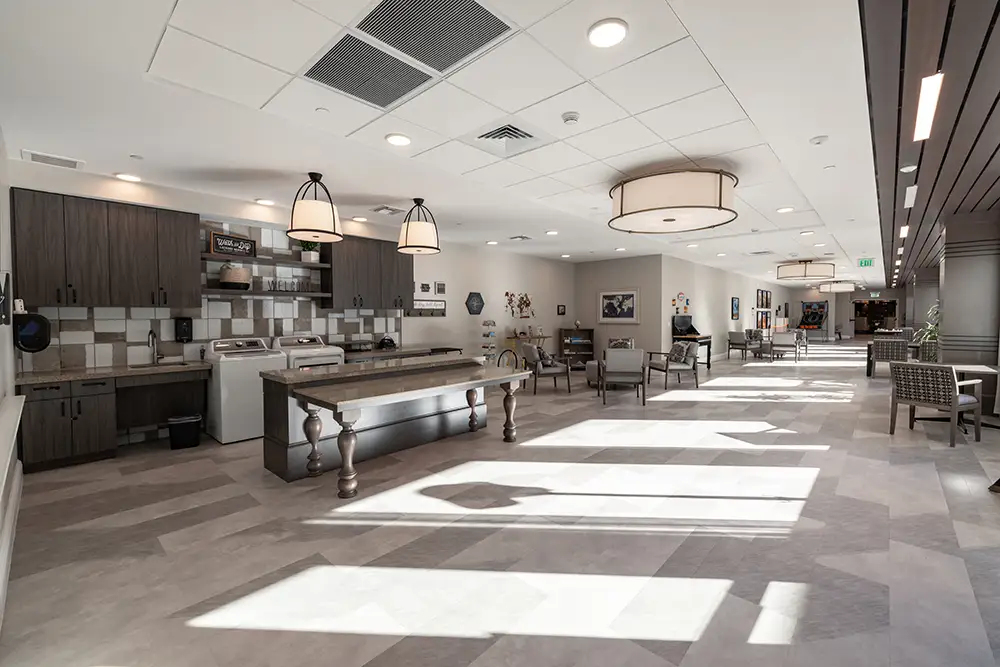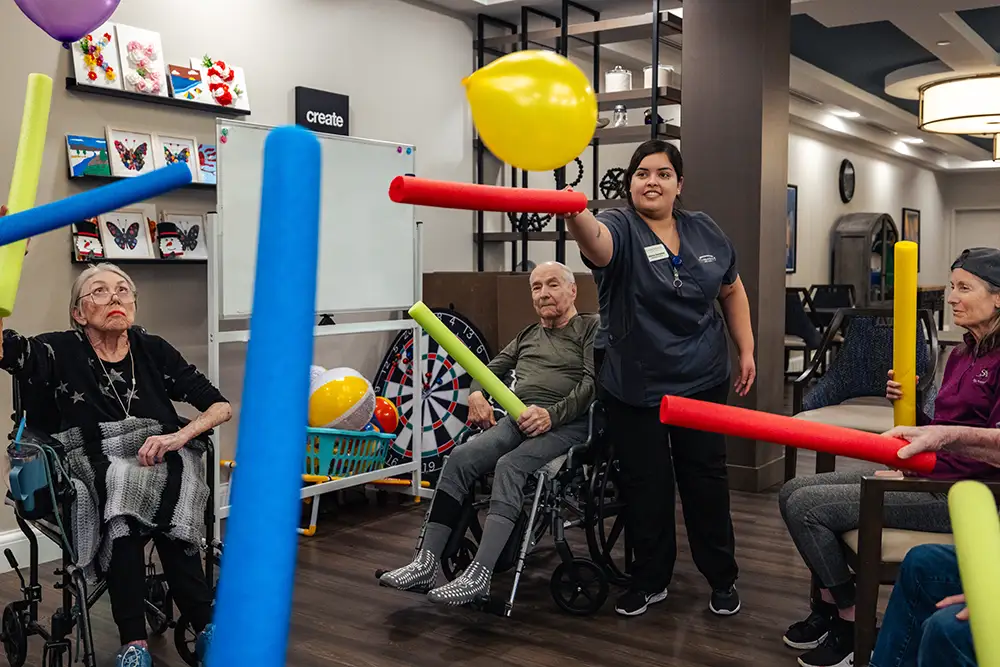What To Expect From a Memory Care Community
As the need for specialized dementia and Alzheimer’s care grows, memory care communities are designed to provide a supportive, safe environment that enhances the quality of life for individuals with memory loss. These communities offer specialized care, structured routines, and customized environments to meet the unique needs of memory care residents, ensuring they have the support they need while maintaining as much independence as possible. Here’s what you can expect from a memory care facility (or community) when considering options for a loved one.
The Purpose of Memory Care Communities
Memory care communities are crafted to provide a structured yet comfortable environment for residents living with Alzheimer’s disease or other forms of dementia. With specialized staff and medical professionals, these communities cater to unique needs by offering assistance with activities of daily living, personalized care plans, and secure settings to minimize the risk of wandering.
Memory care programs, such as those at Clarendale Arcadia, integrate both emotional support and physical safety, allowing residents to thrive and families to feel assured that their loved ones are in caring, capable hands.
Key Features of Memory Care
Memory care communities share certain key features designed to support well-being, foster engagement, and enhance the day-to-day experiences of residents. Here’s what sets memory care apart:
1. Safe and Secure Environments
One of the defining features of memory care is a secure environment. Controlled entries and exits prevent residents from wandering – a common concern among those with memory impairments. Common areas are designed with visibility and easy navigation in mind, providing a sense of independence without compromising safety.
The common areas in memory care communities often include activity rooms, a spacious dining room, and various comfortable seating areas where residents can socialize or simply relax. At Clarendale Arcadia, for example, both indoor and outdoor spaces are designed to allow residents to move freely within a secure perimeter, fostering a sense of freedom without compromising security.
2. Personalized Care Plans
Care plans tailored to each resident’s unique needs and abilities are at the heart of memory care. Since memory loss affects everyone differently, caregivers work with families and medical professionals to create a care plan that includes assistance with activities of daily living, medication management, and regular health assessments. These plans evolve over time as the needs of memory care residents change.
With regular reviews, the care team can adjust levels of support as needed, ensuring that the resident receives comprehensive, compassionate care as they navigate the different stages of dementia or Alzheimer’s.
3. Specialized Staff and Expertise
Staff in memory care communities undergo specialized training to understand the challenges associated with memory loss and cognitive decline. Caregivers are specially trained to manage behavioral symptoms of dementia, offering gentle guidance and support tailored to individual needs. This expertise helps caregivers build strong connections with residents, contributing to a stable, comforting environment that feels like home. Learn more about self-care for caretakers.
Beyond daily caregiving, memory care communities often have medical professionals on staff or on call to handle more complex health needs. This collaborative approach means residents receive both personal care services and medical oversight, contributing to a holistic model of support.
Engaging Activities for Cognitive and Emotional Health
Engagement is key to mental and emotional well-being, so memory care communities offer a range of activities aimed at keeping residents active, engaged, and connected. Structured daily activities are planned to stimulate cognitive function, encourage socialization, and provide enjoyment. Here’s a closer look at how activities can enhance quality of life for residents:
1. Daily and Weekly Activities
Memory care residents benefit from structured activities that provide a sense of routine and purpose. Typical programs include music therapy, light exercise sessions, arts and crafts, and reminiscence therapy, which encourages residents to discuss past experiences and memories. Clarendale Arcadia’s Heartfelt Connections – A Memory Care Program® offers special events and group activities that allow residents to develop social connections in a supportive environment.
Activities can also be individualized based on residents’ histories, preferences, and abilities. For instance, someone who enjoyed gardening may participate in a gardening club, while another who loved to cook may join supervised kitchen activities. These options foster a sense of accomplishment, boost confidence, and offer comfort.
2. Nutritious Dining Experiences
Mealtimes are both nourishing and social in memory care communities. Dining rooms are typically designed to reduce noise and distractions, making it easier for residents to focus on their meals and enjoy the experience. Memory care communities offer meals tailored to specific dietary needs, ensuring residents receive balanced, nutritious options that promote overall health.
Communal dining is often encouraged, providing a social aspect to meals. This daily interaction helps alleviate feelings of loneliness and strengthens community bonds. Many communities, like Clarendale Arcadia, offer a variety of dining options and snacks throughout the day, ensuring residents have flexible access to meals without compromising their preferences or nutritional needs.
A Holistic Approach to Memory Care: Supporting Physical, Mental, and Emotional Health
Assistance with activities of daily living (ADLs), such as bathing, dressing, and grooming, is often necessary for memory care residents. By providing support with these essential activities, memory care communities help residents maintain their dignity and independence in a structured setting. This attention to physical needs, combined with consistent emotional support, enhances their quality of life.
Outdoor spaces in memory care communities offer a calm, sensory experience, contributing to residents' well-being. Access to nature, whether through walking paths, gardens or patios, helps residents relax and engage in light physical activities. Exposure to fresh air and natural surroundings has been shown to have a positive impact on mood, reducing symptoms of anxiety and agitation.
Family Involvement and Support
Families play an integral role in the care plan, and memory care communities encourage family involvement in every aspect of care. Visiting hours are typically flexible, and many communities host family events and support groups that allow families to stay connected. Regular communication between families and staff also ensures that care plans are consistent with the family’s preferences and the resident’s needs.
For families, the transition to memory care can be challenging, but memory care communities offer support through the adjustment period. Family members are encouraged to attend certain activities or join residents for meals, allowing them to feel part of the community. Learn more about the stages of dementia.
Choosing a Memory Care Community
When searching for a memory care community, it’s important to tour each community, meet with staff, and observe the environment to ensure it aligns with your loved one’s needs. Look for a community that prioritizes a person-centered approach, with specially trained staff, comfortable and accessible common areas, and engaging activities designed for those with dementia.
Clarendale Arcadia takes pride in offering a supportive and secure environment tailored to the unique needs of memory care residents. From quality dining experiences and engaging activities to skilled medical professionals who are always ready to help, Clarendale Arcadia provides families with peace of mind, knowing their loved ones are cared for in a nurturing, welcoming community.

Discover Compassionate Memory Care at Clarendale Arcadia
At Clarendale Arcadia, we understand the importance of compassionate, personalized care plans for individuals with dementia or Alzheimer’s. Our memory care program offers a safe and enriching environment designed to support residents' physical, emotional, and cognitive well-being.
Learn more about how our specialized memory care community can make a difference in your loved one’s life and provide your family with peace of mind. Contact us today to schedule a visit.

